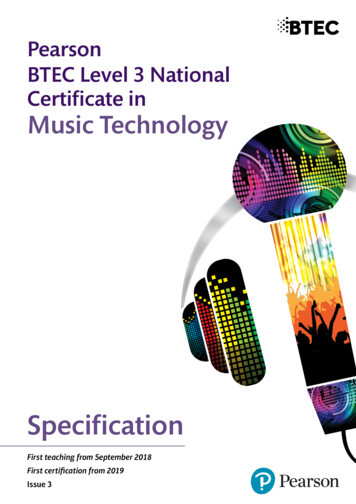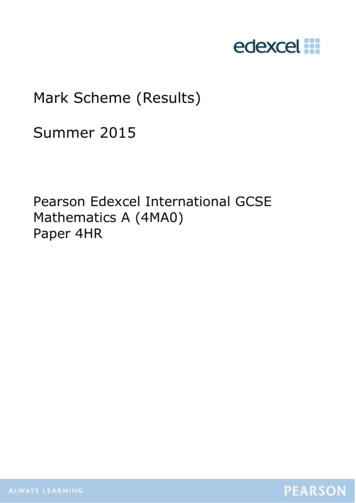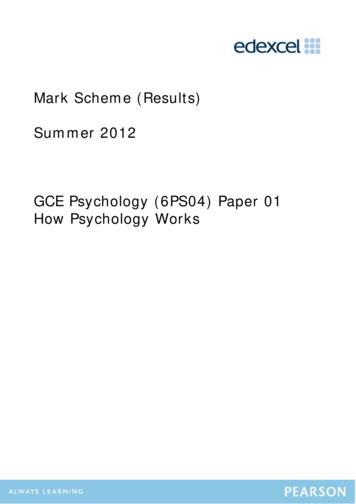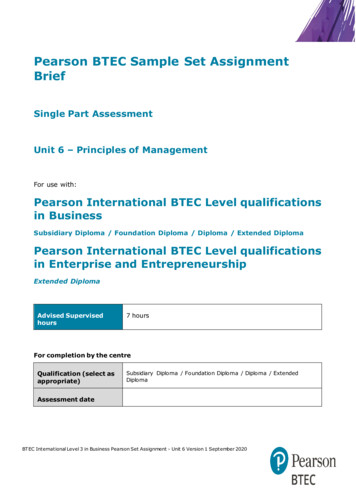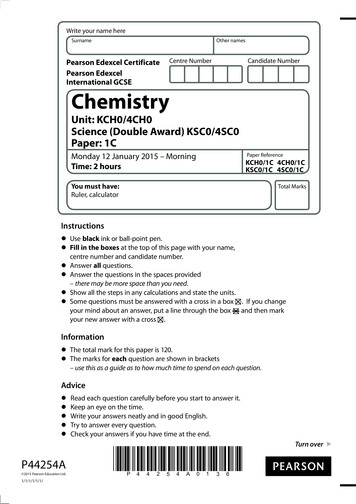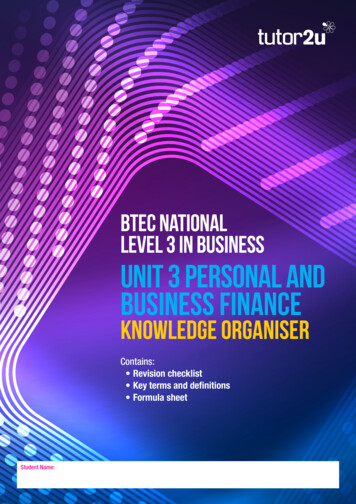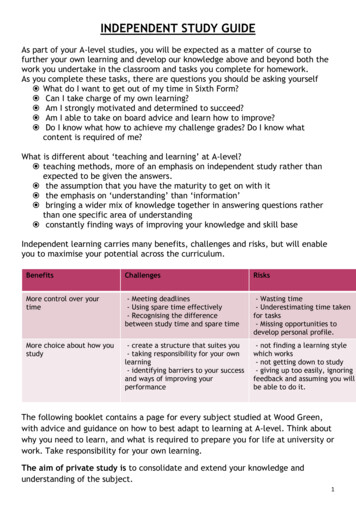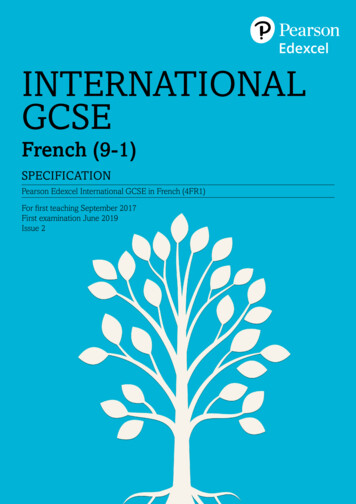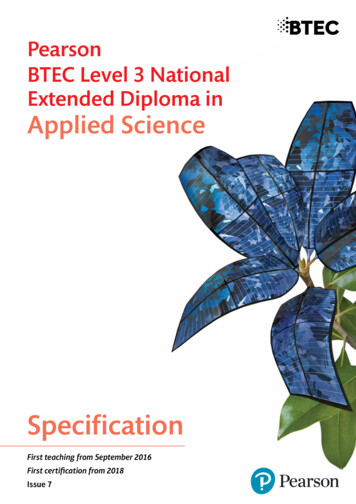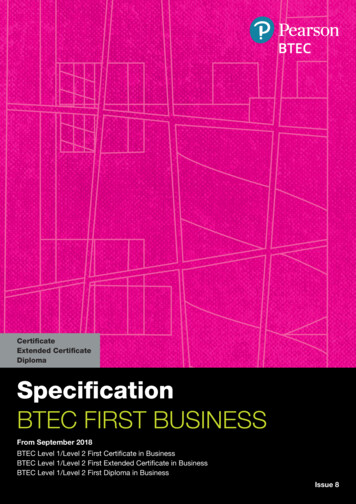
Transcription
CertificateExtended CertificateDiplomaSpecificationBTEC FIRST BUSINESSFrom September 2018BTEC Level 1/Level 2 First Certificate in BusinessBTEC Level 1/Level 2 First Extended Certificate in BusinessBTEC Level 1/Level 2 First Diploma in BusinessIssue 8
PearsonBTEC Level 1/Level 2First Certificatein BusinessPearsonBTEC Level 1/Level 2First Extended Certificatein BusinessPearsonBTEC Level 1/Level 2First Diploma inBusinessSpecificationFirst teaching September 2018Issue 8
Edexcel, BTEC and LCCI qualificationsEdexcel, BTEC and LCCI qualifications are awarded by Pearson, the UK’s largestawarding body offering academic and vocational qualifications that are globallyrecognised and benchmarked. For further information, please visit our qualificationswebsite at qualifications.pearson.com. Alternatively, you can get in touch with ususing the details on our contact us page at qualifications.pearson.com/contactusAbout PearsonPearson is the world's leading learning company, with 25,000 employees in more than70 countries working to help people of all ages to make measurable progress in theirlives through learning. We put the learner at the centre of everything we do, becausewherever learning flourishes, so do people. Find out more about how we can help youand your learners at qualifications.pearson.comThis specification is Issue 8. We will inform centres of any changes to this issue.The latest issue can be found on our website.References to third-party material made in this specification are made in good faith.We do not endorse, approve or accept responsibility for the content of materials,which may be subject to change, or any opinions expressed therein. (Material mayinclude textbooks, journals, magazines and other publications and websites.)All information in this specification is correct at time of publication.ISBN 978 1 446 93609 2All the material in this publication is copyright Pearson Education Limited 2020
Summary of Pearson BTEC Level 1/Level 2 Certificate, Extended Certificate andDiploma in Business Issue 8 changesSummary of changes made between previous issue and thiscurrent issuePage/sectionnumberTQT for the Certificate has changed to 320.Page 6TQT for the Extended Certificate has changed to 480.TQT for the Diploma has changed to 640.Summary of changes made between Issue 4 and Issue 7Page/sectionnumberThe wording in Section 8 Internal assessment subsection Dealingwith malpractice has been updated to clarify suspension ofcertification in certain circumstances.Page 39Section 10 Awarding and reporting the qualificationsPage 44The wording under Calculation of qualification change has beenupdated by deletion of the bullet ‘have sufficient points across themandatory units i.e 24 points’.The wording under Section 10 Awarding and reporting for thequalifications subsection Calculation of the qualification grade hasbeen updated to clarify current practice in ensuring maintenance andconsistency of qualification standards.Page 48References to CD, DVD and Video have been updated to Digitalmedia throughout the specification,ThroughoutAll dates of legislation have been removed in order to future proofthe specification.ThroughoutReference to the marketing process of Tesco in America has beenremoved from the Unit Introduction.Page 131Annexe D has been updated:Unit 9 Principles of Marketing as Mandatory for the Certificate.Page 440Unit 24 to 32 as optional for the Certificate and the ExtendedCertificate.Page 441If you need further information on these changes or what they mean, please contact usvia our website at: qualifications.pearson.com.
Welcome to your BTEC First specificationFor more than 25 years, BTECs have earned their reputation as well-established,enduringly effective qualifications. They have a proven track record in improvingmotivation and achievement among young learners. Additionally, BTECs provideprogression routes to the next stage of education or to employment.Key principles of the BTEC FirstsTo support young people to succeed and progress in their education, we have drawn onour consultation and embedded four key design principles into the BTEC Firsts.1 Standards: a common core and external assessmentEach Level 2 BTEC First qualification has an essential core of knowledge and appliedskills. We have introduced external assessment appropriate to the sector. This providesindependent evidence of learning and progression alongside the predominantlyportfolio-based assessment.2 Quality: a robust quality-assurance modelBuilding on strong foundations, we have further developed our quality-assurance modelto ensure robust support for learners, centres and assessors.We will make sure that: every BTEC learner’s work is independently scrutinised through the externalassessment process every BTEC assessor will take part in a sampling and quality review during theteaching cycle we visit each BTEC centre every year to review and support your quality processes.We believe this combination of rigour, dialogue and support will underpin the validityof the teacher-led assessment and the learner-centric approach that lie at the heart ofBTEC learning.3 Breadth and progression: a range of options building on the mandatory units,contextualised English and mathematicsMandatory units, developed in consultation with employers and educators,give learners the opportunity to gain a broad understanding and knowledge of thevocational sector.Optional specialist units focus more closely on a vocational area, supportingprogression to a more specialised Level 3 vocational or academic course or to anApprenticeship.Opportunities to develop skills in English and mathematics are indicated in the unitswhere appropriate. Where appropriate to the sector, learners will practise these essentialskills in naturally occurring and meaningful contexts.
4 Recognising achievement: opportunity to achieve at Level 1The BTEC Firsts will continue to provide for the needs of learners who are aiming toachieve a Level 2 qualification. However, we have recognised that for some learnersachieving this standard in all units in one to two years may not be possible. Therefore,the qualifications have been designed as Level 1/Level 2 qualifications with gradesavailable at Level 2 and at Level 1 Pass.Improved specification and supportWe asked what kind of guidance you, as teachers and tutors, need. As a result, we havestreamlined the specification to make the units easier to navigate, and we provideenhanced support in the accompanying Delivery Guide.Thank you
ContentsPurpose of this specification1Qualification titles and Qualification Numbers21 What are BTEC Firsts?32 Key features of the BTEC First suite of qualifications53 Pearson BTEC Level 1/Level 2 First Certificate, Extended Certificateand Diploma in Business11Rationale for the Pearson BTEC Level 1/Level 2 First Certificate, ExtendedCertificate and Diploma in Business114 Qualification structures17Qualification structure for the Pearson BTEC Level 1/Level 2 First Certificate inBusiness18Qualification structure of the Pearson BTEC Level 1/Level 2 First ExtendedCertificate in Business20Qualification structure of the Pearson BTEC Level 1/Level 2 First Diploma inBusiness225 Programme delivery24Resources24Delivery approach25Personal, learning and thinking skills25English and mathematics knowledge and skills25Functional Skills at Level 2266 Access and recruitment27Prior knowledge, skills and understanding27Access to qualifications for learners with disabilities or specific needs28Special consideration287 The layout of units in the specification298 Internal assessment32Language of assessment32Summary of internal assessment32Assessment and verification roles32Learner preparation34Designing assessment instruments34Authenticity and authentication36Applying criteria to internal assessments36Assessment decisions37Late submission38Resubmission of improved evidence38Appeals39
Dealing with malpractice39Reasonable adjustments to assessment39Special consideration399 External assessment41Grade descriptors for the internal and external units4210 Awarding and reporting for the qualifications4411 Quality assurance of centres5112 Further information and useful publications5213 Professional development and support53Units55Unit 1: Enterprise in the Business World57Unit 2: Finance for Business67Unit 3: Promoting a Brand73Unit 4: Principles of Customer Service79Unit 5: Sales and Personal Selling89Unit 6: Introducing Retail Business99Unit 7: Providing Business Support109Unit 8: Recruitment, Selection and Employment119Unit 9: Principles of Marketing131Unit 10: Using Business Documentation137Unit 11: Building Successful Business Teams147Unit 12: Introducing Law and Consumer Rights159Unit 13: Financial Planning and Forecasting169Unit 14: Business Online179Unit 15: Public Sector Business193Unit 16: Enhancing the Customer Experience203Unit 17: Visual Merchandising in Retail Business213Unit 18: Small Business Planning225Unit 19: Introducing Project Management241Unit 20: Delivering and Improving Customer Service253Unit 21: Effective Business Communication269Unit 22: Working in Business Teams285Unit 23: Planning, Forecasting and Recording Business Finances299Unit 24: Work Experience in Business313Unit 25: Introducing International Business331Unit 26: Introducing the Economic Environment343Unit 27: Efficient Business Operations357Unit 28: Principles of Procurement and Supply371Unit 29: Implementing Procurement and Supply in Business383Unit 30: Corporate Social Responsibility395Unit 31: Managing Personal Finances407Unit 32: Sustainability in the Business Workplace417
Annexe APersonal, learning and thinking skillsAnnexe BLevel 2 Functional SkillsAnnexe CSynoptic assessmentAnnexe DSummary of units in the BTEC Level 1/Level 2 First in Business427427433433437437439439
INTRODUCTIONPurpose of this specificationThe purpose of this specification, as defined by Ofqual, is to set out: the objectives of each qualification in the suite any other qualification that a learner must complete before taking a qualification any prior knowledge, skills or understanding that the learner is required to havebefore taking the qualifications units that a learner must complete before a qualification can be awarded,and any optional routes any other requirements that a learner must have satisfied before they can beassessed, or before a qualification can be awarded the knowledge, skills and understanding that will be assessed as part of thequalifications (giving a clear indication of their coverage and depth) the method of any assessment and any associated requirements relating to it the criteria against which learners’ level of attainment will be measured(such as assessment criteria) any specimen materials (supplied separately) any specified levels of attainment.Pearson BTEC Level 1/Level 2 First Certificate, Extended Certificate and Diploma in Business –Issue 8 – August 2020 Pearson Education Limited 20201
INTRODUCTIONQualification titles andQualification NumbersQualificationtitlePearson BTEC Level 1/Level 2 First Certificate in BusinessQualificationNumber (QN)600/6815/2QualificationtitlePearson BTEC Level 1/Level 2 First Extended Certificate inBusinessQualificationNumber (QN)600/6816/4QualificationtitlePearson BTEC Level 1/Level 2 First Diploma in BusinessQualificationNumber (QN)601/0171/4These qualifications are on the Regulated Qualifications Framework (RQF).Your centre should use the Qualification Number (QN) when seeking funding foryour learners.The qualification title, units and QN will appear on each learner’s final certificate.You should tell your learners this when your centre recruits them and registers them withus. Further information on certification is in our UK Information Manual, available on ourwebsite: qualifications.pearson.com2Pearson BTEC Level 1/Level 2 First Certificate, Extended Certificate and Diploma in Business –Issue 8 – August 2020 Pearson Education Limited 2020
INTRODUCTION1 What are BTEC Firsts?BTEC First qualifications were originally designed for use in colleges, schools andthe workplace as an introductory Level1/Level 2 course for learners who want to studyin the context of a vocational sector. The knowledge, understanding and skills learned instudying a BTEC First will aid progression to further study and prepare learners to enterthe workplace.These qualifications are intended primarily for learners in the 14–19 age group,but they may also be used by other learners who wish to gain an introductoryunderstanding of a vocational area. When taken as part of a balanced curriculum,there is a clear progression route to a Level 3 course or an Apprenticeship.BTECs are vocationally-related qualifications, where learners develop knowledgeand understanding by applying their learning and skills in a work-related context.They are popular and effective because they enable learners to take responsibility fortheir own learning and to develop skills that are essential for the modern-day workplace.These skills include: teamworking; working from a prescribed brief; working to deadlines;presenting information effectively; and accurately completing administrative tasks andprocesses. BTEC Firsts motivate learners and open doors to progression to further studyand responsibility in the workplace.Pearson BTEC Level 1/Level 2 First Certificate, Extended Certificate and Diploma in Business –Issue 8 – August 2020 Pearson Education Limited 20203
INTRODUCTIONObjectives of the BTEC First suiteThe BTEC First suite will: enable you, as teachers, tutors and training providers, to offer a high-qualityvocational and applied curriculum that is broad and engaging for all learners help you to secure a balanced curriculum overall, so that learners in the 14–19 agegroup have the opportunity to apply their knowledge, skills and understanding inthe context of future development provide learners with opportunities to link education and the world of work inengaging, relevant and practical ways enable learners to enhance their English and mathematical competence in relevant,applied scenarios support learners’ development of transferable interpersonal skills, including workingwith others, problem solving, independent study, and personal, learning andthinking skills provide learners with a route through education that has clear progressionpathways to further study or an Apprenticeship.Breadth and progressionThese qualifications have a core of underpinning knowledge, skills and understanding,and a range of options to reflect the breadth of pathways within a sector. This giveslearners the opportunity to: gain a broad understanding and knowledge of a vocational sector investigate areas of specific interest develop essential skills and attributes prized by employers, further educationcolleges and higher education institutions.This suite of qualifications provides opportunities for learners to progress to eitheracademic or more specialised vocational pathways.Progression from Level 1These qualifications have been designed to provide progression from the followingqualifications, which contain sector-relevant content at Level 1: Pearson BTEC Level 1 Certificate in Business Pearson BTEC Level 1 Diploma in Business.These qualifications are also designed to provide progression from thefollowing qualifications: Pearson BTEC Level 1 Certificate in Vocational Studies Pearson BTEC Level 1 Diploma in Vocational Studies.See our website for further details.4Pearson BTEC Level 1/Level 2 First Certificate, Extended Certificate and Diploma in Business –Issue 8 – August 2020 Pearson Education Limited 2020
INTRODUCTION2 Key features of the BTEC First suite ofqualificationsThe BTEC Level 1/Level 2 First qualifications: have a range of sizes in the suite are Level 2 qualifications; learners who do not achieve at Level 2 may achieve agrade of Level 1 Pass have smaller sizes in the suite primarily aimed at learners aged 14 years and over,while the Extended Certificate and Diploma have been designed for those aged16 years and over are available on the Regulated Qualifications Framework (RQF) present knowledge in a work-related context give learners the opportunity to develop and apply skills in English andmathematics in naturally occurring, work-related contexts provide opportunities for synoptic assessment through applying skills, knowledgeand understanding gained to realistic or work-related tasks, such as projects andwork experience, and to deepen learning through more specialist units.The Pearson BTEC Level 1/Level 2 First Award: has mandatory and optional specialist units has 25 per cent of the qualification that is externally assessed. Pearson sets andmarks these assessments is graded from Level 2 P to Level 2 D*. Learners who do not achieve at Level 2 mayachieve a grade of Level 1 Pass. Learners whose level of achievement is belowLevel 1 will receive an Unclassified (U) result.The Pearson BTEC Level 1/Level 2 First Certificate: has mandatory and optional specialist units has 25 per cent of the qualification that is externally assessed; Pearson sets andmarks these assessments is graded from Level 2 PP to Level 2 D*D*. Learners who do not achieve at Level 2may achieve a grade of Level 1 Pass. Learners whose level of achievement is belowLevel 1 will receive an Unclassified (U) result.The Pearson BTEC Level 1/Level 2 First Extended Certificate: has mandatory and optional specialist units has 16.67 per cent of the qualification that is externally assessed; Pearson sets andmarks these assessments is graded from Level 2 PP to Level 2 D*D*. Learners who do not achieve at Level 2may achieve a grade of Level 1 Pass. Learners whose level of achievement is belowLevel 1 will receive an Unclassified (U) result.Pearson BTEC Level 1/Level 2 First Certificate, Extended Certificate and Diploma in Business –Issue 8 – August 2020 Pearson Education Limited 20205
INTRODUCTIONThe Pearson BTEC Level 1/Level 2 First Diploma: has mandatory and optional specialist units has 12.5 per cent of the qualification that is externally assessed; Pearson sets andmarks these assessments is graded from Level 2 PP to Level 2 D*D*. Learners who do not achieve at Level 2may achieve a grade of Level 1 Pass. Learners whose level of achievement is belowLevel 1 will receive an Unclassified (U) result.6Pearson BTEC Level 1/Level 2 First Certificate, Extended Certificate and Diploma in Business –Issue 8 – August 2020 Pearson Education Limited 2020
INTRODUCTIONTotal qualification time (TQT)For all regulated qualifications, Pearson specifies a total number of hours that itis expected learners will be required to undertake in order to complete and showachievement for the qualification: this is the Total Qualification Time (TQT).The TQT value indicates the size of a qualification.Within this, Pearson will also identify the number of Guided Learning Hours (GLH) thatwe expect a centre delivering the qualification will need to provide. Guided learningmeans activities that directly or immediately involve tutors and assessors in teaching,supervising, and invigilating learners, such as lessons, tutorials, online instruction andsupervised study.In addition to guided learning, other required learning directed by tutors or assessors willinclude private study, preparation for assessment and undertaking assessment when notunder supervision, such as preparatory reading, revision and independent research.Qualifications can also have a credit value, which is equal to one tenth of TQT, roundedto the nearest whole number.Qualification sizes for BTEC Firsts in the Business sectorThis suite of BTEC Level 1/Level 2 Firsts for the Business sector is available in thefollowing sizes:GLHTQTFirst Award120160First Certificate240320First Extended Certificate360480First Diploma480640Pearson BTEC Level 1/Level 2 First Certificate, Extended Certificate and Diploma in Business –Issue 8 – August 2020 Pearson Education Limited 20207
INTRODUCTIONTypes of units in the qualificationsThe BTEC First qualifications have mandatory units and optional specialist units.See Section 4 Qualification structures for more detailed information. For thesequalifications, learners will need to complete all the mandatory units and,where appropriate, a selection of optional specialist units. This is to ensurethat all learners have broad and balanced coverage of the vocational sector.Mandatory unitsMandatory units are designed to cover the body of content that employers and educatorswithin the sector consider essential for 14–19-year-old learners. These units supportthe remainder of the learning needed for these qualifications. There will be both internaland external assessment.Optional specialist unitsThe remaining units in these qualifications are sector-specific, optional specialist units.These units focus on a particular area within the vocational sector and give learners anopportunity to demonstrate knowledge, skills and understanding.8Pearson BTEC Level 1/Level 2 First Certificate, Extended Certificate and Diploma in Business –Issue 8 – August 2020 Pearson Education Limited 2020
QUALIFICATIONPearson BTECLevel 1/Level 2First Certificate,Extended Certificateand Diploma in BusinessPearson BTEC Level 1/Level 2 First Certificate, Extended Certificate and Diploma in Business –Issue 8 – August 2020 Pearson Education Limited 20209
10Pearson BTEC Level 1/Level 2 First Certificate, Extended Certificate and Diploma in Business –Issue 8 – August 2020 Pearson Education Limited 2020
QUALIFICATION3 Pearson BTEC Level 1/Level 2 FirstCertificate, Extended Certificate andDiploma in BusinessRationale for the Pearson BTEC Level 1/Level 2 FirstCertificate, Extended Certificate and Diploma inBusinessAimsThe aims of all qualifications in the BTEC First suite in Business are to: inspire and enthuse learners to consider a career in the Business sector give learners the opportunity to gain broad knowledge and understanding of,and develop skills in, the Business sector support progression to specialised Level 3 qualifications in Business, or to anApprenticeship give learners the potential opportunity, in due course, to enter employment in awide range of job roles.Specific aims of the BTEC First Certificate in Business are to: add breadth to learners’ knowledge and understanding of the Business sector aspart of their career progression and development plans support learners who have had some achievement in their Key Stage 4 programmeand who wish to ‘top up’ their Level 2 achievement to progress to employment orother qualifications.Specific aims of the BTEC First Extended Certificate in Business are to: build on learner achievement and interest developed through related Level 1 orLevel 2 qualifications in Business, including the Pearson BTEC Level 1/Level 2 FirstAward and Certificate in Business allow learners to specialise or to deepen their understanding through the provisionof a broad range of optional specialist units provide a comprehensive and challenging programme of study related to Businessthat is particularly suited to post-16 learners who have the relevant interest andaptitude to progress in the sector give learners the potential opportunity to progress to employment or toemployment in a wide range of job roles across the Business sector.Specific aims of the BTEC First Diploma in Business are to: allow learners to further specialise by including units that require 60 GuidedLearning Hours of study give learners opportunities to develop transferable skills related to study andvocational application that provide a platform for success both within Business andelsewhere.Pearson BTEC Level 1/Level 2 First Certificate, Extended Certificate and Diploma in Business –Issue 8 – August 2020 Pearson Education Limited 202011
QUALIFICATIONThe provision for study in the BTEC Level 1/Level 2 First Certificate,Extended Certificate and DiplomaBTEC First Certificate and Extended CertificateThese qualifications are built on three mandatory units that form the fundamentalknowledge and understanding of business principles. Two of the three mandatory unitsUnit 1: Enterprise in the Business World and Unit 2: Finance for Business appear in allsizes of the BTEC Level1/Level 2 First qualifications in Business. These qualificationsalso include a choice of optional specialist units, thereby providing an opportunityto develop a broader understanding of the business sector. In addition it introduces alimited number of specialist areas and the opportunity to acquire some of the practicalskills identified by employers as the fundamental building blocks for future competencein the workplace. All the units can be viewed in the Summary of units in the BTEC Level1/Level 2 First in Business in Annexe D.BTEC First DiplomaIn the Diploma, there are additional mandatory units that help learners develop theability to draw together and apply learning in vocational applications.Mandatory units:The mandatory units within these qualifications ensure that all learners will develop: knowledge that underpins learning in other units in the qualification:o for example, Unit 1: Enterprise in the Business World – this unit introduces learnersto the world of business – how businesses work, what they do, trends that affectthem, how they operate and the factors that could determine whether they aresuccessful or not. The unit also allows learners to develop their entrepreneurial skillsbut developing a business idea for their local community. This unit is internallyassessed. practical and vocational skills:o for example, Unit 2: Finance for Business – in this unit the learner will developknowledge of the fundamental areas of business finance. They will learn about thecosts involved in business and how a business makes a profit, how a business plansfor success and to avoid financial difficulty, and how to put together financialstatements. This unit is externally assessed. understanding of the sector, employment and careers, for example:o Unit 3: Promoting a Brand – this unit explores the role of branding and promotionwithin business, allowing the learner to develop their own promotional campaign.This unit is internally assessed ability to apply knowledge and demonstrate analysis through external assessment:o for example, Unit 9: Principles of Marketing – in this unit, learners investigate thekey principles involved in marketing planning, including identifying markets, themarketing mix and market research. This unit is both mandatory and externallyassessed as it is key for any learner wishing to progress in the business world tohave a fundamental knowledge of markets and their behaviour.o Unit 19: Introducing Project Management – this unit introduces learners to thefundamentals of project management and allows them to apply these skills to abusiness project of their choosing. This unit is internally assessed.12Pearson BTEC Level 1/Level 2 First Certificate, Extended Certificate and Diploma in Business –Issue 8 – August 2020 Pearson Education Limited 2020
QUALIFICATION ability to draw together and apply learning in vocational applications:o for example, Unit 18: Small Business Planning – this synoptic unit requires learnersto bring together the knowledge, skills and understanding they have gained fromother units of study and develop a full business plan for a small business idea oftheir choosing. Learners will use their knowledge of finance, enterprise, marketingand project management to plan, present and reflect on their small business idea,using and developing key skills such as independent investigation and research skillsand techniques, data collection, data processing and analysis, which are valued byemployers and support progression to level 3 qualifications. This unit isinternally assessed.Optional specialist unitsThe optional specialist units offer centres flexibility to tailor the programme to the localarea and give learners the opportunity to pursue more specialist interests. Unit 9: Principles of Marketing, which investigates the key principles involved inmarketing planning including identifying markets, the marketing mix and marketresearch. This unit is mandatory and externally assessed as it is key for anyonewishing to move into the business sector to have a strong understanding of theprinciples of marketing. The unit will support the learning across other unitswithin the qualification, in particular Units 3, 4, 5, 6, 14 and 15. Unit 10: Using Business Documentation, which allows learners to developknowledge and understanding of the most appropriate forms of writtencommunication for conveying messages to internal audiences, externalstakeholders and the public. Unit 11: Building Successful Business Teams, which investigates the importance ofteamwork and effective communication within business teams. The unit focuses onthe roles of different team members and allows a learner to evaluate their own rolein a team and how a team can be more successful in achieving its objectives. Unit 12: Introducing Law and Consumer Rights, which introduces the areaof consumer law. This unit allows learners to investigate the most up to datelegislation affecting both buyers and sellers in the business world. Learnerswill be able to develop a practical knowledge of aspects of consumer law andlegal terminology. Unit 13: Financial Planning and Forecasting is a unit that builds on the financeknowledge gained in Unit 2: Finance for Business. Here learners will investigatebreak-even analysis, cash flow analysis and budgeting in more detail, and theywill have the opportunity to evaluate the use of each tool in financial planning. Unit 14: Business Online is a 60-GLH unit in which learners will explore onlinebusiness activity, understand the reasons why a business would have an onlinepresence and develop an online presence for a busine
contextualised English and mathematics Mandatory units, . Enterprise in the Business World 57 Unit 2: Finance for Business 67 Unit 3: Promoting a Brand 73 Unit 4: Principles of Customer Service 79 Unit 5: Sales and Personal Selling 89 Unit 6: Introducing Retail Business 99 Unit 7: Providing Business Support 109 Unit 8: Recruitment, Selection .
